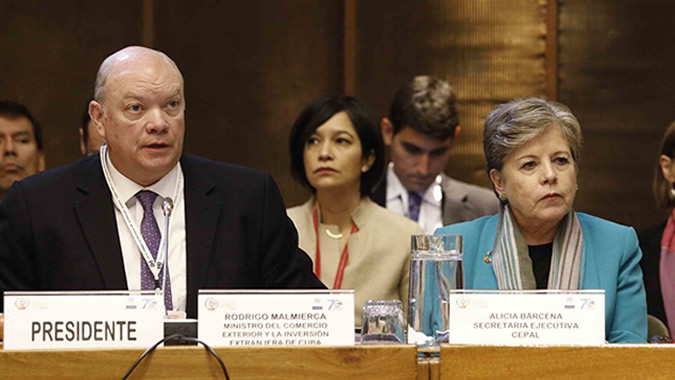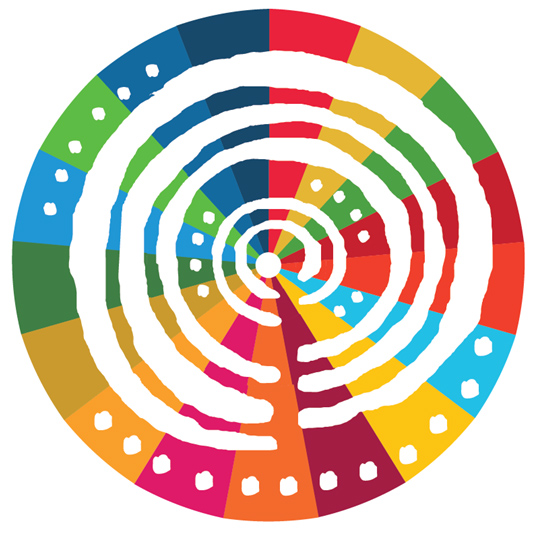Countries of the Region Reaffirm their Commitment to Sustainable Development and Urge for an Articulated Response to Counteract the Pandemic’s Profound Effects
Work area(s)
Rodrigo Malmierca, Minister of Foreign Trade and Foreign Investment of Cuba, in his capacity as chair of ECLAC’s Committee of the Whole, spoke today during a segment on “Regional Forums: Key Messages,” held in the framework of the High-level Political Forum 2020.

Latin American and Caribbean countries reaffirmed today their commitment to sustainable development and urged for an articulated response at all levels to halt and counteract the profound effects that the region will experience due to the coronavirus (COVID-19) pandemic, which does not distinguish between borders, ideologies or development levels.
Rodrigo Malmierca – the Minister of Foreign Trade and Foreign Investment of Cuba, in his capacity as chair of the Committee of the Whole of the Economic Commission for Latin America and the Caribbean (ECLAC) – participated in a segment entitled “Regional Forums: Key Messages,” held in the framework of the High-level Political Forum on Sustainable Development 2020.
In his remarks, Minister Malmierca warned that it is clear that achievement of the 2030 Agenda is at risk. Only a few targets have been met or are close to being met, and accomplishing the rest will necessitate greater policy intervention and the transformation of current development models, he asserted.
He added that the situation today has become more complex due to the multisectoral impact prompted by the COVID-19 pandemic, which requires countries to take urgent action to avoid delays or rollbacks in the achievement of the Sustainable Development Goals (SDGs) and their targets, and to strengthen positive trends in their implementation.
“The countries of Latin America and the Caribbean face these challenges from a disadvantageous position due to the region’s poor economic performance in recent years, and to the growing levels of indebtedness acquired. The region has a sharper deceleration in its economic growth than other regions and a historical performance that is inferior to that of the last seven decades. ECLAC forecasts a 9.1% fall in the region’s GDP in 2020, which is the worst decline in history,” the Minister warned.
He highlighted Caribbean countries in particular and called for fostering a space of collaboration and mutual support, sharing problems and challenges that they have as a result of COVID-19 to be able to achieve joint work, at a regional level, that would allow for responding to the urgencies faced by the Caribbean population.
Malmierca underscored that today more than ever, the region continues to bet on renewed and strengthened multilateralism, discouraging extreme protectionist or nationalist stances, rejecting the adoption of unilateral coercive measures that violate the norms and principles of International Law, enshrined in the United Nations Charter, and that undermine the consensus and joint efforts of our countries to overcome this humanitarian crisis and its effects, and to move towards Sustainable Development.
He added that to ensure a decade of action and transformation for achieving the Sustainable Development Goals in the current circumstances, it is imperative that measures be taken to strengthen financial, monetary and fiscal systems and to bolster social protection systems and carry out preventive actions for adaptation and mitigation of the environmental emergency, without neglecting the diverse needs and challenges that countries in special situations face – in particular, the least advanced countries, landlocked developing countries and Small Island Developing States (SIDS) – or the specific challenges confronted by middle-income countries.
“We demand that they get fair, special and differentiated treatment that guarantees that no one will be left behind,” he stressed.
The Minister also emphasized that this moment in time and common sense demand that the international community set aside political differences and, together, seek solutions through international cooperation and solidarity, in an environment of respect for sovereignty and countries’ self-determination.
“We must identify our potentialities and work with greater agility and flexibility to identify opportunities, joint projects and the exchange of successful experiences, taking advantage of the region’s vast experience to carry out initiatives through South-South and triangular cooperation,” he affirmed.
Malmierca expressed regret over the postponement of the Fourth Meeting of the Forum of the Countries of Latin America and the Caribbean on Sustainable Development, which was due to take place last March in Havana, Cuba and had to be suspended because of the prevailing epidemiological situation. However, he indicated, thanks to the support of all the development actors in the region and to the work of ECLAC and the Chair headed by Cuba, the Forum’s suspension did not hinder ongoing action in pursuit of sustainable development.
In addition, he highlighted the creation of the Sustainable Development Goals Gateway in Latin America and the Caribbean (SDG Gateway), a knowledge management platform on the 2030 Agenda developed collaboratively by the United Nations system in the region, and of the COVID-19 Observatory in Latin America and the Caribbean, a source of information and analysis about the economic and social consequences of the pandemic that allows for following the evolution of the crisis and the short, medium and long-term measures being implemented by the 33 countries of Latin America and the Caribbean.
Finally, Rodrigo Malmierca stated that, although challenges and obstacles for achieving the SDGs endure, “we believe and support the idea that our actions can ensure success and can change course towards the 2030 that we all desire.”
“We ratify our region’s commitment to Sustainable Development and trust in the good performance of the United Nations System to continue accompanying our nations in the quest for a better world for present and future generations,” he concluded.
Country(ies)
- Latin America and the Caribbean
